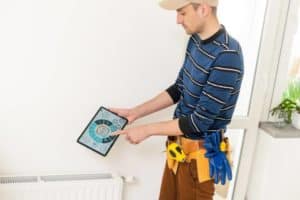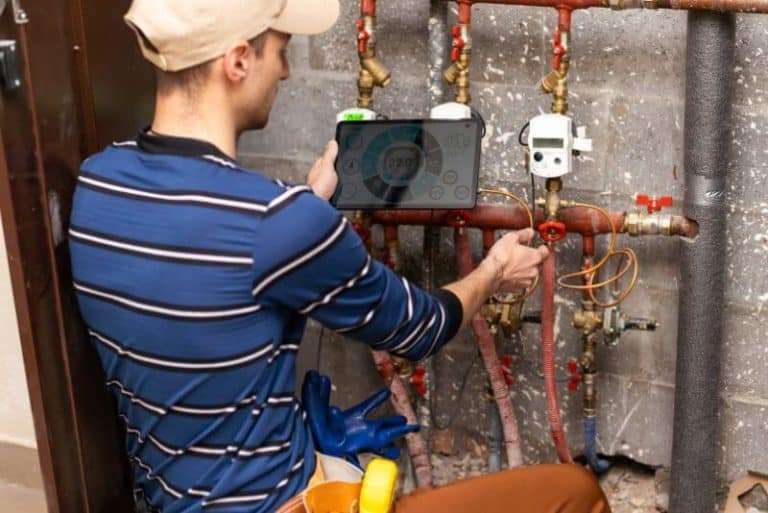Is your heating system making strange noises? A loud bang, persistent humming, or sharp whistling can be unsettling—and they’re often signs of underlying issues. You might wonder, Why is the heating system noisy? The truth is, that unusual sounds can indicate anything from minor airflow problems to serious mechanical failures. Ignoring them could lead to costly repairs or even system breakdowns.In this guide, we’ll break down the most common heating system noises, what causes them, and how to fix them. By understanding these sounds and taking proactive steps, you can keep your heating system running smoothly and quietly, ensuring a warm and comfortable home.
Why Is a Heating System Noisy?
Heating system noises can stem from various issues, including mechanical problems, airflow restrictions, or even normal operation. Identifying the type of noise and its cause is crucial to determining the best solution. In some cases, the noise might be harmless, but persistent or loud sounds often indicate a problem that needs attention. Regular maintenance can help prevent these noises from developing into more serious issues.
Common Noises and Their Causes

Your heating system may produce various noises, each indicating a different problem. Identifying the type of noise can help pinpoint the cause and determine the best way to fix it.
Banging or Knocking Noises
Banging or knocking sounds in a heating system are usually caused by:
- Air in the Pipes: In hydronic (hot water-based) heating systems, air trapped in the pipes can cause loud knocking sounds when the water flow is obstructed.
- Delayed Gas Ignition: In gas furnaces, a buildup of gas before ignition can lead to a small explosion, causing a loud bang.
- Expanding and Contracting Ductwork: Metal ductwork expands when heated and contracts when cooled, sometimes creating popping or banging sounds.
How to Fix It:
- Bleed the air out of the heating system if you have a boiler.
- Regularly maintain your gas furnace to ensure the burners ignite properly.
- Insulate or adjust ductwork to minimize expansion noises.
Whistling or Hissing Noises
A whistling or hissing sound often indicates:
- Clogged Air Filter: A dirty air filter can obstruct airflow, causing air to whistle through small gaps.
- Leaky Ducts: Small holes or gaps in the ductwork can create a whistling sound as air escapes.
- High Gas Pressure: In gas furnaces, excessive gas pressure can cause a hissing noise.
How to Fix It:
- Replace or clean the air filter regularly.
- Inspect and seal any leaks in the ductwork.
- Contact a professional if you suspect high gas pressure.
Rattling or Vibrating Noises
Rattling or vibrating sounds may stem from:
- Loose Panels or Screws: Heating units have multiple panels and components that may become loose over time.
- Debris in the System: Small objects or dirt inside the heating system can cause rattling noises.
- Blower Motor Issues: A malfunctioning blower motor can cause excessive vibration.
How to Fix It:
- Tighten any loose screws or panels.
- Clean out debris from the heating system.
- Lubricate or replace the blower motor if necessary.
Humming or Buzzing Sounds
Humming or buzzing noises could indicate:
- Electrical Issues: A faulty transformer, capacitor, or relay switch may cause electrical humming.
- Blower Motor Problems: An aging or failing blower motor might emit a persistent hum.
- Vibrating Components: Certain parts may vibrate due to wear and tear.
How to Fix It:
- Check and replace any faulty electrical components.
- Inspect and maintain the blower motor.
- Secure any vibrating components to reduce noise.
Clicking Noises
Clicking sounds are often due to:
- Ignition System Issues: In a gas furnace, repeated clicking can indicate problems with the ignition system or flame sensor.
- Relay Switches: Electrical components in heating systems can produce normal clicking sounds when turning on and off.
- Loose Fan Blades: The fan blades inside the blower can become loose, causing a clicking sound as they move.
How to Fix It:
- Inspect and clean the flame sensor.
- Ensure the fan blades are securely attached.
- If the clicking is excessive, call a technician to inspect the ignition system.
Scraping or Grinding Noises
Scraping or grinding sounds may indicate:
- Worn-out Blower Bearings: Bearings in the blower motor can wear down over time, causing a grinding noise.
- Loose Fan Blades: If the fan blades come into contact with other components, they can create scraping sounds.
- Broken Heat Exchanger: A damaged heat exchanger can sometimes cause metal-on-metal noises.
How to Fix It:
- Lubricate or replace worn-out blower bearings.
- Tighten or replace loose fan blades.
- Call a professional to inspect the heat exchanger if you suspect damage.
Preventive Maintenance to Reduce Noise
Taking preventive measures can help minimize heating system noise and prolong its lifespan. Here are some essential HVAC troubleshooting tips:
- Schedule Regular Inspections: Having a professional check your heating system annually can help catch issues before they become major problems.
- Change Air Filters Frequently: A clean air filter ensures proper airflow and prevents whistling or hissing noises.
- Bleed Air from Radiators: If you have a boiler system, bleeding air from the radiators can prevent knocking sounds.
- Lubricate Moving Parts: Applying lubricant to the blower motor and fan can reduce friction-related noises.
- Secure Loose Parts: Periodically tighten screws and check for loose components.
When to Call a Professional
While some heating system noise troubleshooting can be handled with DIY fixes, certain noises require professional intervention. Consider calling a heating technician if:
- The noise is getting progressively louder or more frequent.
- You suspect a gas leak or electrical issue.
- The heating system is not providing sufficient warmth.
- DIY fixes do not resolve the problem.
A professional can accurately diagnose and fix complex common furnace problems, ensuring your home heating system repair is done correctly.
Conclusion</h2
A noisy heating system isn’t just an annoyance—it’s often a sign of an underlying issue that, if left unchecked, could lead to costly repairs or system failure. By identifying different sounds and their causes, you can take action early to prevent costly home heating system repairs.Regular maintenance, such as changing air filters, tightening loose components, and scheduling annual inspections, can help minimize noise and extend your heating system’s lifespan. However, if the sounds persist or worsen, it’s best to call a professional to diagnose and fix the problem before it escalates.



